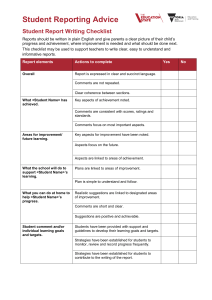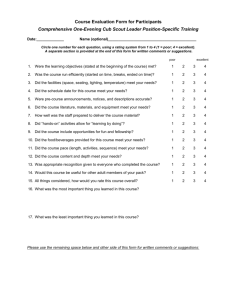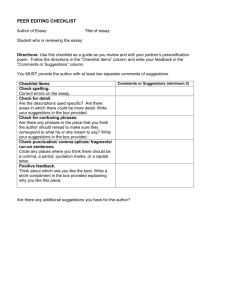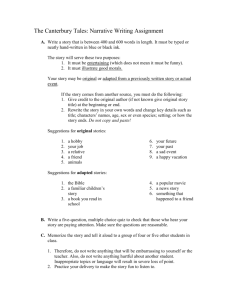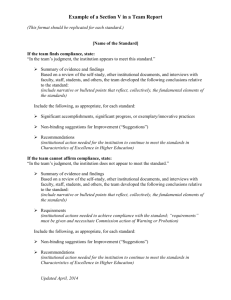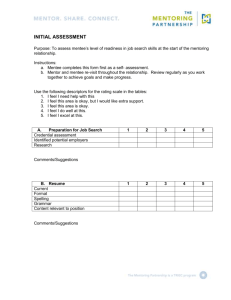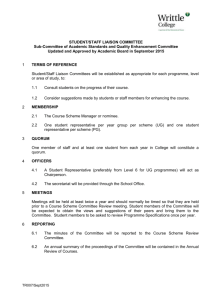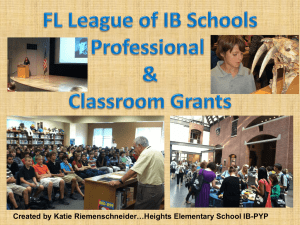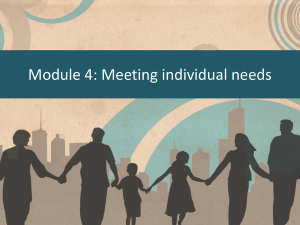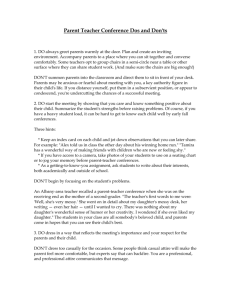Classroom Curriculum Orientation
advertisement
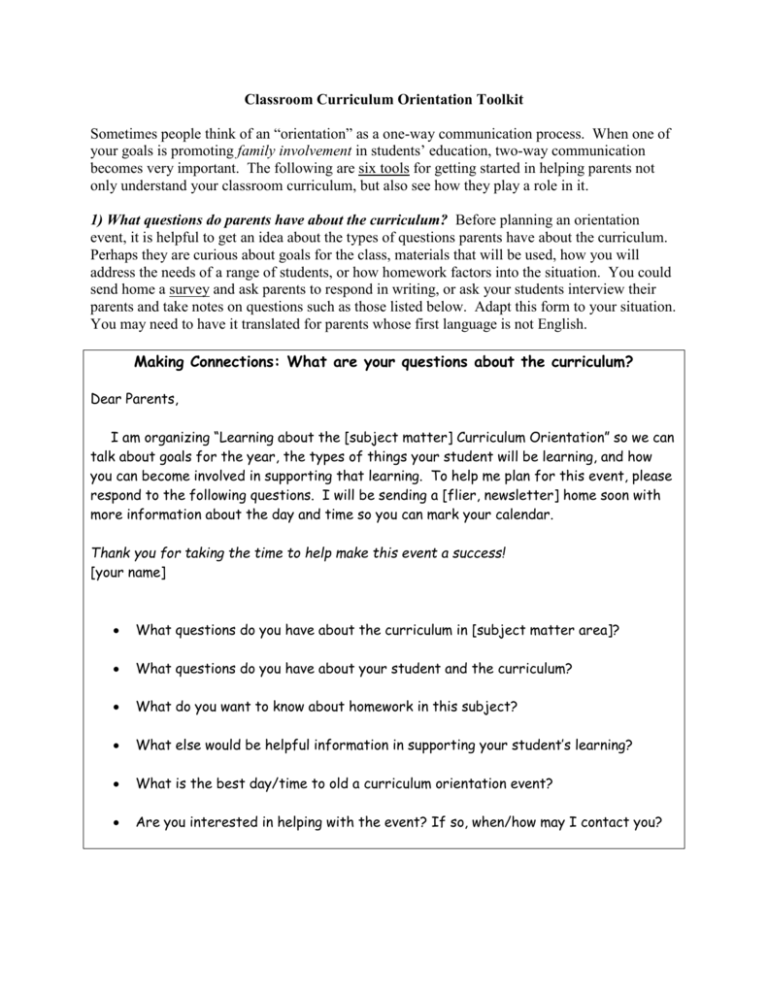
Classroom Curriculum Orientation Toolkit Sometimes people think of an “orientation” as a one-way communication process. When one of your goals is promoting family involvement in students’ education, two-way communication becomes very important. The following are six tools for getting started in helping parents not only understand your classroom curriculum, but also see how they play a role in it. 1) What questions do parents have about the curriculum? Before planning an orientation event, it is helpful to get an idea about the types of questions parents have about the curriculum. Perhaps they are curious about goals for the class, materials that will be used, how you will address the needs of a range of students, or how homework factors into the situation. You could send home a survey and ask parents to respond in writing, or ask your students interview their parents and take notes on questions such as those listed below. Adapt this form to your situation. You may need to have it translated for parents whose first language is not English. Making Connections: What are your questions about the curriculum? Dear Parents, I am organizing “Learning about the [subject matter] Curriculum Orientation” so we can talk about goals for the year, the types of things your student will be learning, and how you can become involved in supporting that learning. To help me plan for this event, please respond to the following questions. I will be sending a [flier, newsletter] home soon with more information about the day and time so you can mark your calendar. Thank you for taking the time to help make this event a success! [your name] What questions do you have about the curriculum in [subject matter area]? What questions do you have about your student and the curriculum? What do you want to know about homework in this subject? What else would be helpful information in supporting your student’s learning? What is the best day/time to old a curriculum orientation event? Are you interested in helping with the event? If so, when/how may I contact you? 2) What do I think parents need to know about the curriculum? With only an hour or so to spend with parents, you will need to be strategic in choices about how to spend your time. The following planning guide can help you outline key points you want to communicate and establish priorities for meeting both your needs while also being responsive to parents’ questions. Information About the Curriculum What are my goals for the students? Why are these goals important? What types of tasks do I develop to help students reach the goals? How do I assess student progress and evaluate their learning? What types of homework assignments do I give? What role(s) do I want parents to play in supporting their student’s learning? How will parents stay informed about what is expected of them and maintain communication with me? What are key challenges the parents and I will need to overcome and how will we work together to them (e.g., linguistic differences, students’ motivation, behavior issues)? 3) How do I engage parents in an informative, engaging discussion that is responsive to their questions? When parents make time to come to the school for the evening, keep in mind that they (like you) will already have spent a long day at work or home. So you want the evening to be informative and engaging. A first step is to help parents feel comfortable with you and with each other. A second step is to engage parents in a meaningful task, one that helps them experience the types of learning that typically takes place in your classroom. A third step is debriefing the experience. With this groundwork laid, you are ready to communicate the information you think is important and respond to questions. The following planning guide may be useful in getting ready for your event. Planning Guide for Classroom Curriculum Orientation How will I help parents feel comfortable? Suggestions: Show/discuss brief slide show of students interacting in the classroom Ask parents to share something about their students Provide a walking tour of the classroom that shows different materials and resources Use ice-breaker activity to help people relax What task will parents engage in to learn about what we do in class? Suggestions: Sponge activities used at the beginning of day or class Partner or small group work Typical homework assignment What supports may parents need as they complete the task? Translator Respect for their communication style How will we debrief the activity? Suggestions: Parents talk about their response to the activity Parents discuss what was hard/easy about the task Parents ask questions about the task How will I communicate information about the curriculum? Suggestions: Provide brief handout (translate if necessary) Include drawings/graphics to illustrate main ideas and key connections Use Power Point slides or video to illustrate your curriculum in action How will I elicit and respond to parent questions? Suggestions: Use questions collected from survey Ask parents to write questions on 3 x 5 cards Ask parents to meet in small groups and list key questions on poster board How will our evening come to a close? Suggestions: Ask parents what they would find useful as next steps Ask parents to fill out a written evaluation 4) How will I get a good turnout for the event? Successful orientations require active promotion—to get the word out, to remind parents, and to create a curiosity about the event. A Checklist for Promoting Good Parent Turnout Publicize: Use simple, inviting language (and have it translated if necessary) to let parents know about the event initially and to provide reminders. o Newsletters, fliers o School calendar o School or classroom website Provide Food: Food is a great way to get people to gather together and help create a relaxing atmosphere. Let people know ahead of time what type of food is available so they can plan their schedules around it. o Provide light snacks (juice, pretzels, apples) o Have parents sign up to purchase pizza or another type of food that could be their dinner if they’re coming from work Get Input from Parents: Parents can help with making the event a success in a variety of ways. o Planning o Phone tree for publicity and reminders o Translator for written materials o Food o Child care, transportation for families Accommodate Family Schedules: Use the information you gathered from parents to select the best day/time to gather people together. Include Students: Students can become your best recruiters for your event. They can: o Write hand-written invitations to parents o Remind parents of the upcoming event o Help plan which task(s) parents will complete during the event o Provide child care (secondary) o Be greeters or guides to the classroom Provide Services: Families have different needs and experience different challenges in being able to attend school events. The following are examples of services that might assure good participation in your event: o Child care o Find other families who can provide transportation o Arrange translation services 5) What about parents who are not able to come? By thinking in advance about this question, you may be able to find efficient ways to keep parents who were unable to attend your event filled in. The following checklist provides a guide for how to follow up. Follow-Up Checklist Have a sign-in sheet so you are clear about who was able to attend and who may need follow-up information. Develop handouts for the event that make a good summary of ideas covered. Plan for a way to keep a record of what happens during the event so you can provide a summary of questions raised and ideas shared for all parents. o o o o Have a parent take notes Have a student take notes (secondary) Save artifacts from tasks completed Audio tape the meeting (with participants’ permission) Provide contact information and encourage parents to ask questions. 6) How will I find the time to do all of this? At this point, you may be thinking that taking on the planning and development of an event like this is more than you can manage in your beginning years of teaching. At the same time, you know that this is an important step in establishing good communication and helping families understand what you are trying to accomplish in your classroom. Here are some things to consider that may help you: You are Not Alone! Find Out… What school-wide events and services are available that might support my planning and implementation of the event (also see Section VI: Understanding School-Wide Support)? What have my colleagues done in the past and what resources have they used that would help me plan my event? What colleague groups could I collaborate with to share ideas, resources and work load in planning and offering the event (e.g., grade level teams, subject matter departments)? How can I enlist parents to help plan and carry out the event?
